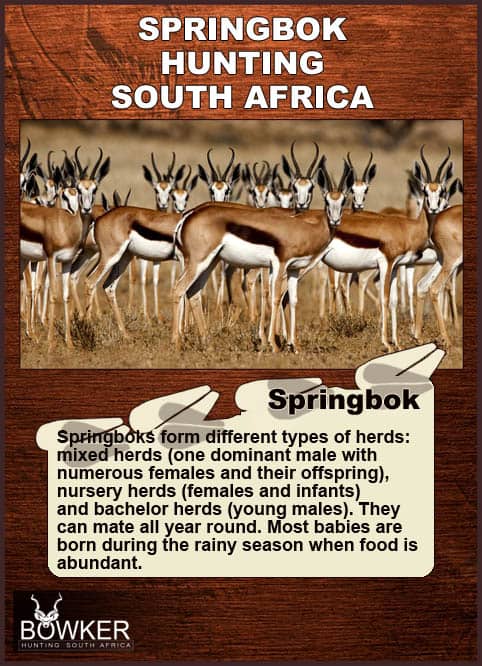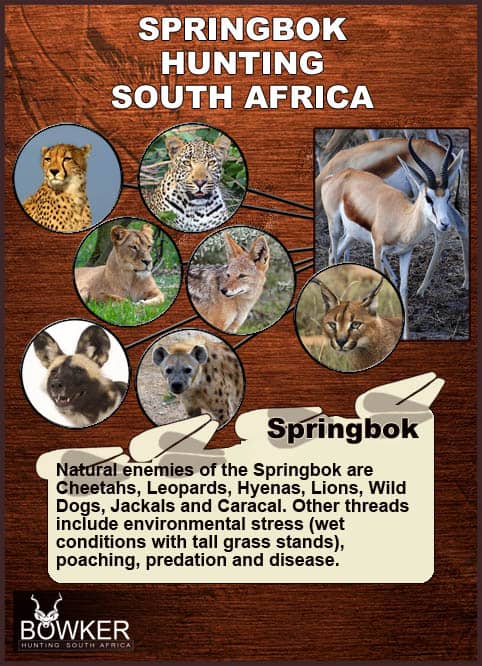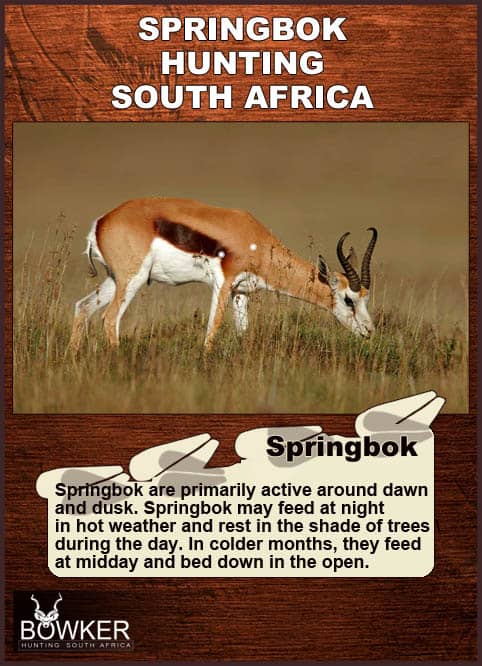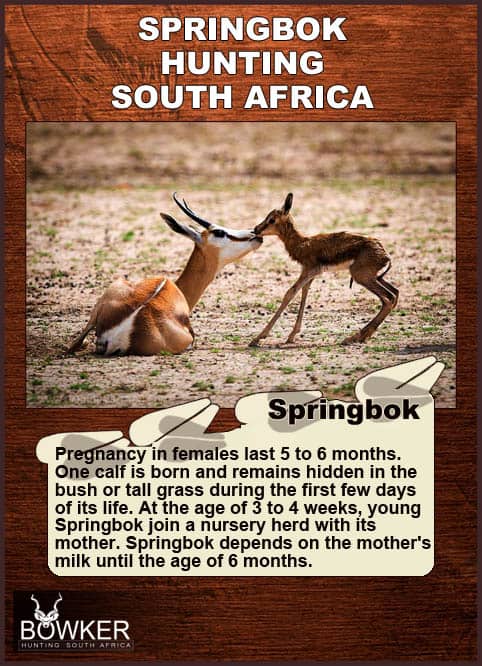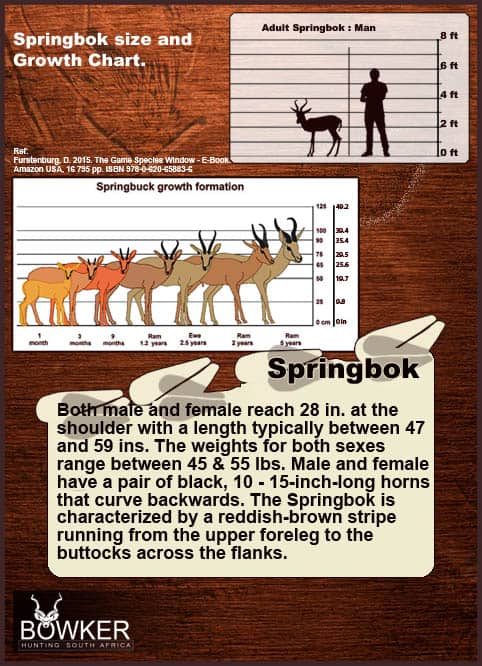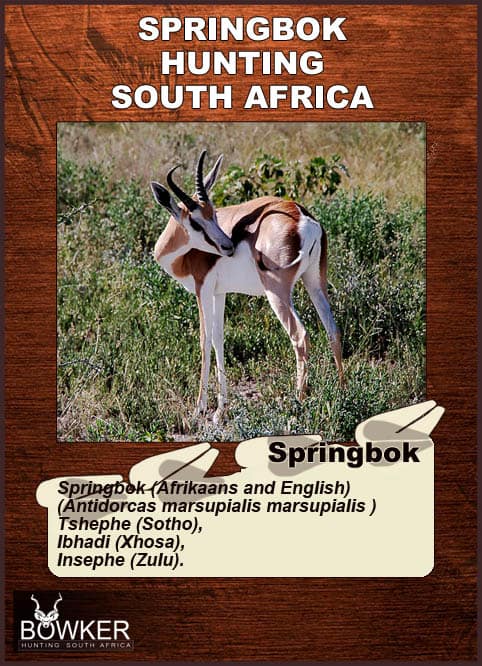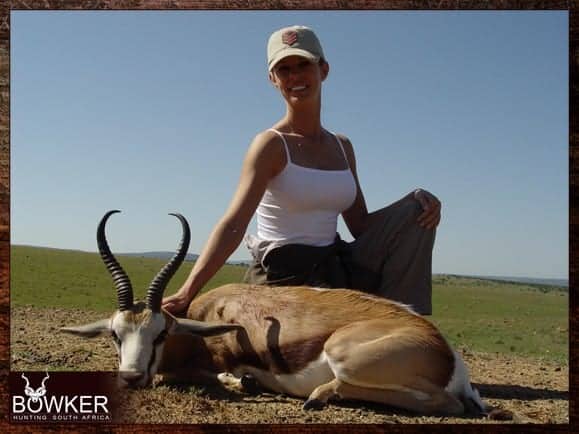
Summary
Springbok Trophy hunting takes place on the open plains, and stalks can be tricky.
Sometimes, a long shot will be required on this hunt.
Springbok is the best-eating of all African antelopes.
There are no seasonal restrictions on Springbok in Eastern Cape, South Africa.
Nick Bowker Hunting offers Springbok safari hunts year-round.
The Springbok is a medium-sized antelope, graceful and handsomely patterned, with a long fold of skin on its back.
The springbok is the national emblem of South Africa.
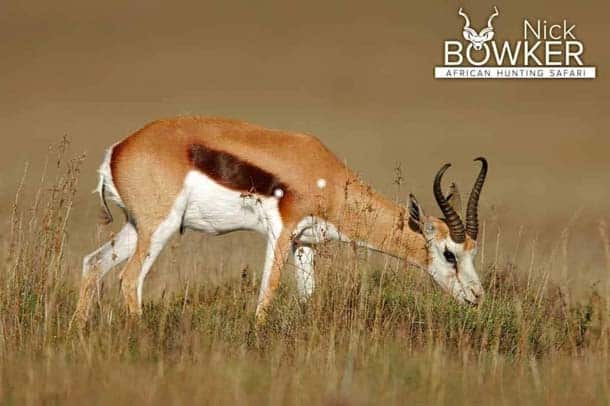
Table of Contents
Springbok Hunting Trophy Fees -2025
The average cost of a Springbok is $350. Springbok is a cheap add-on to the cost of hunting in Africa. A Plains game package hunt often includes a Springbok Trophy.
The Springbok Slam is also an excellent addition to any Africa hunt package. It consists of the Springbok’s four-color phases.
Our prices for 2024 are set out below.
| Species | Price |
| Common Springbok | $350 |
| White Springbok | $1200 |
| Black Springbok | $850 |
| Copper Springbok | $650 |
All-Inclusive $5000 Starter Plains Game Package for seven trophies and eight days hunting. (Inclusive of a Springbok Trophy)
- Gemsbok
- Springbok
- Impala
- Black Wildebeest
- Blesbok
- Warthog
- Mountain Reedbuck
Included in the Springbok trophy hunting package is a licensed hunting guide. As well as a hunting license and all permits. Bow hunting springbok can be difficult.
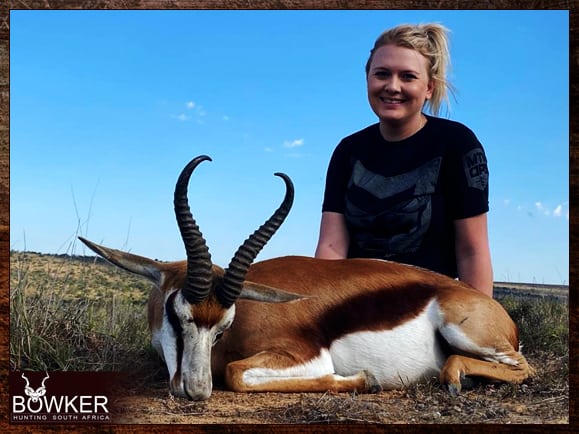
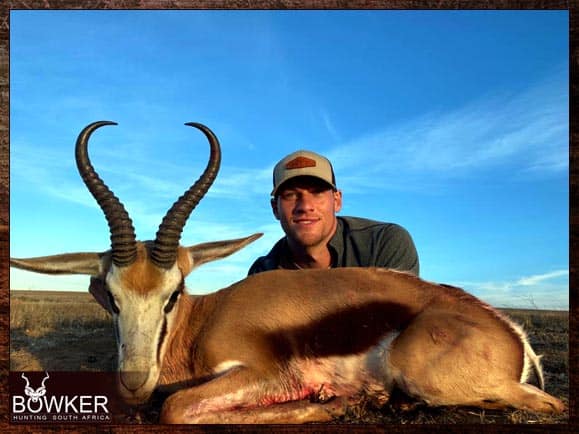
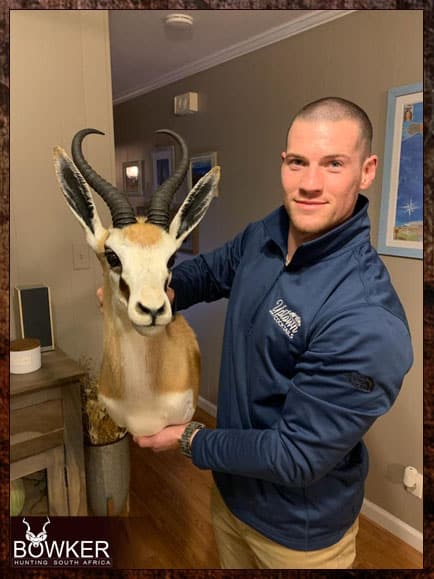
Springbok Hunting in South Africa

Shot placement must be in the bottom third of the animal directly above the front shoulder. This will ensure a heart or lung shot. Avoid head and neck shots, which are high-risk.
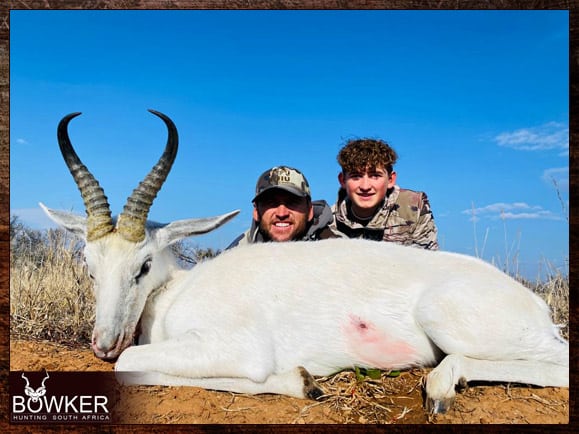
Your springbok ram trophy should have an average shoulder height of around 28 inches, weigh about 50 pounds, and have a Horn Length of approximately 12 inches. Recently a world record springbok of 20 inches has been found.
The Safari Club International minimum score for a springbok is 30, white springbok 28, black springbok 30.5, and copper springbok 25.
The trophy is measured by adding the length of each horn and the circumference of the bases.
The Springbok is the national emblem of the Republic of South Africa.
The name of the antelope originates from the early Dutch settlers in South Africa and the word “spring,” meaning jump.
Its unique trait of “prancing” will make you understand why our ancestors gave it this name.
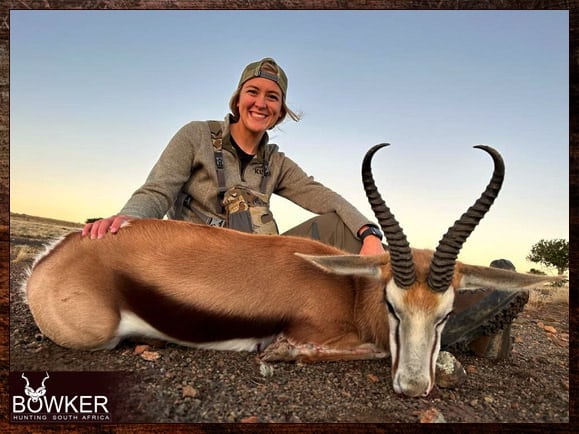
The Springbok is graceful and handsomely patterned, with a long fold of skin on its back.
The skin fold on the back is closed, and when the animal becomes excited, it opens, fanning a length of stiff white hair.
It is believed that after rains, particularly in the Kalahari, for the joy of living, the animals jump up and down like bouncing balls, stretching their front and rear legs simultaneously and bending their heads down (called ‘prancing’).
Springbok is shot mainly in the open plains, and stalks can be tricky. Sometimes, a long shot will be required, especially on the open plains.
Springbok are hunted by spot and stalk and are suitable trophies for the first-time hunter.
Come and join us for the hunt of a lifetime at our safari hunt lodge in the Eastern Cape of South Africa.
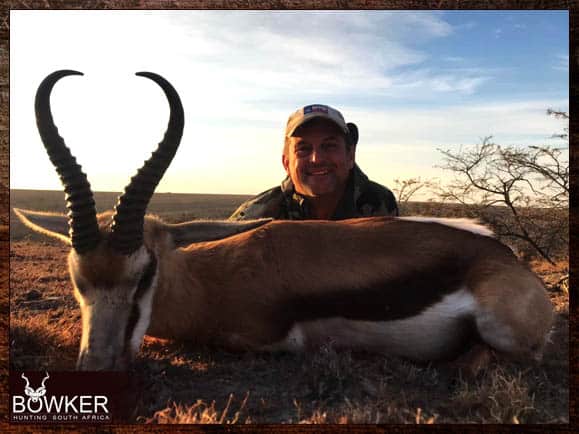
Trophy Judgement and Rifle Caliber for Hunting Springbok
If you can approach within 250 yards, you are doing well, and it is best to take your shot. The flat-shooters will be the right rifle when hunting Springbok.
For those hunters who do not wish to go through the red tape of bringing a rifle into South Africa, Nick Bowker has 300 Magnums fitted with suppressors.
The rifles are mounted with a Swarovski Z8 tactical scopes. We have hand-loaded Hornady ELD-X 200 grain ammunition.
The rifle, including ammunition, is available as part of all hunting packages free of charge.
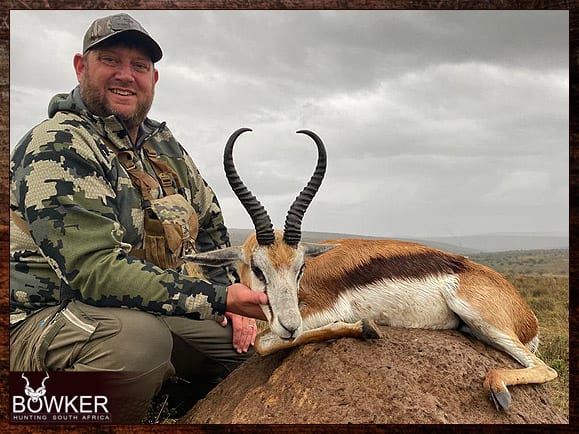
Hunting springbok can be a challenge due to its size and excellent senses. Stalk carefully while keeping the wind in your favor, and get as close as possible.
The trophy quality lies in the bases’ width, the overall length, and the curls on the horns’ tips.
It’s a great trophy to hunt while on safari. It is necessary for any collector interested in collecting the springbok color variations.
Springbok is included in nearly all of our hunting packages, along with kudu, sable antelope, gemsbok, impala, blesbok, warthog, and mountain reedbuck.
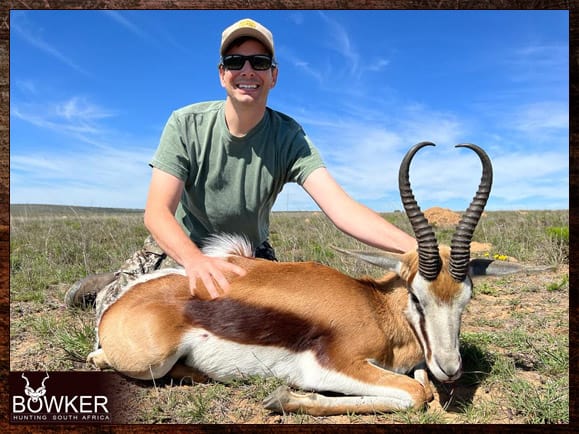
Difference Between Male and Female
The male Springbok has thicker and heavier horns than the female and is slightly heavier with a thicker neck.


Interesting Facts about Springbok for Hunts
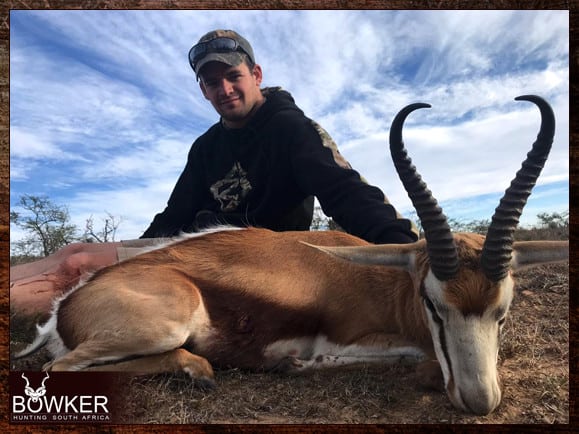
- One of the fastest animals on the planet. Springbok can reach a speed of up to 60 miles per hour.
- They have a pocket-like flap of skin on the rump, which conceals a white crest. When Springbok detects predators, the crest is visible. The white crest sends a message to other members of the group.
- Springbok has long, pointed ears, a long neck, and a slender body. Lyre-shaped horns can be seen in males and females (they are longer and thicker in males).
- Springbok is a herbivore (plant-eater). The springbok’s diet is grasses, leaves, roots, and tubers.
- Natural enemies of springboks are cheetahs, leopards, hyenas, lions, wild dogs, jackals, and lynxes.
- Springbok form a few herds: mixed herds (one dominant male with numerous females and their offspring) and bachelor herds.
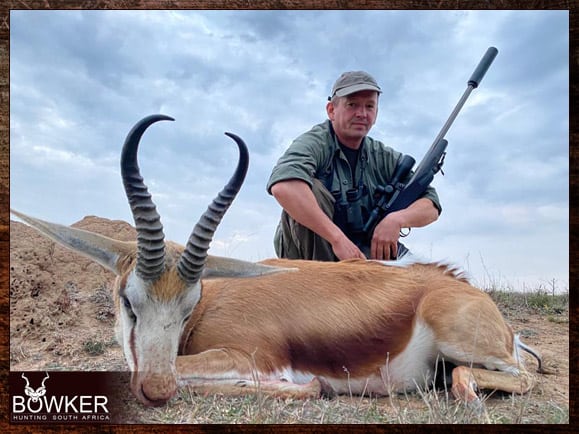
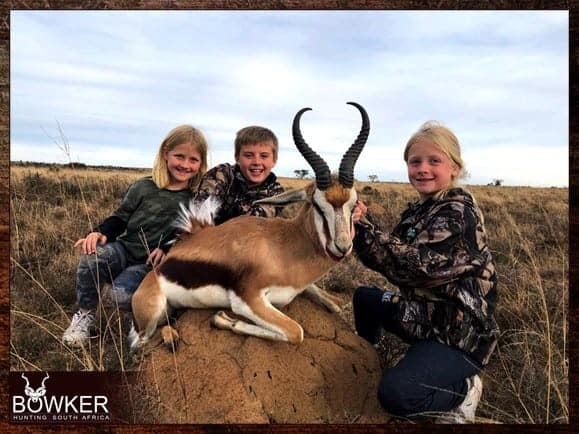
- Springbok (antidorcas marsupialis) can mate all year round. Young are born at the start of the rainy season in summer when food is abundant.
- Pregnancy in females lasts 5 to 6 months and ends with one baby hidden in the bush or tall grass during the first few days of life. At 3 to 4 weeks, young springbok joins a nursery herd with its mother.
- Springbok depends on the milk of the mother until the age of about six months. Females often stay within their native herds, while males leave them at 6 to 12 months to join bachelor herds.
- Females reach sexual maturity at one year and males at two years.
- Springbok can survive up to 10 years in the wild.
- Springbok hunting is very similar to blesbok hunting as they share the same characteristics.
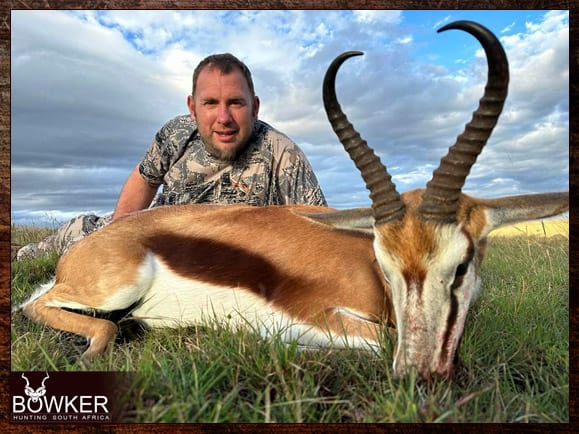
About the Springbok for Your Africa hunt
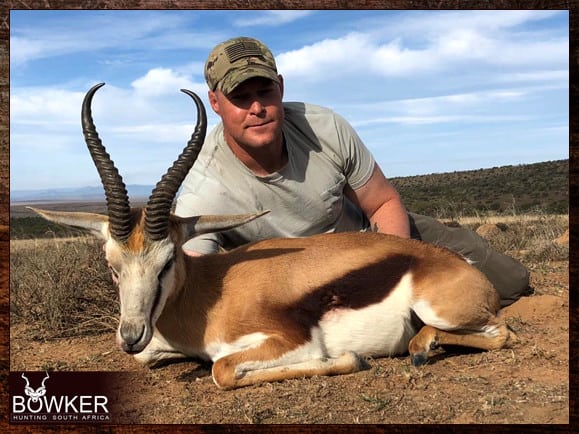
Springbok is primarily active around dawn and dusk.
The weather influences activity; Springbok can feed at night in hot weather and midday in colder months.
They rest in the shade of trees or bushes and often lie in the open when the weather is cooler.
The mixed-sex herds or harems have a roughly 3:1 sex ratio; bachelor individuals are also observed in these herds.

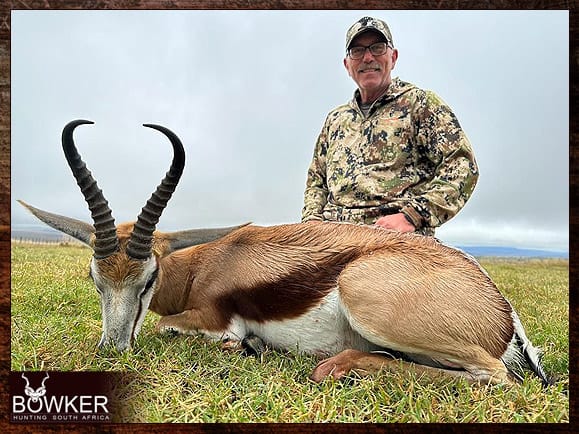
The Springbok is a medium-sized, slender antelope with long legs. Both sexes reach 28 inches at the shoulder with a head-and-body length typically between 47 and 59 inches. The weights for both sexes range between 45 and 55 pounds. Both sexes have a pair of black, 10 – 15-inch-long horns that curve backward.
They have a white face and a dark stripe from the eyes to the mouth. A light-brown coat marked by a reddish-brown line that runs from the upper foreleg to the buttocks.
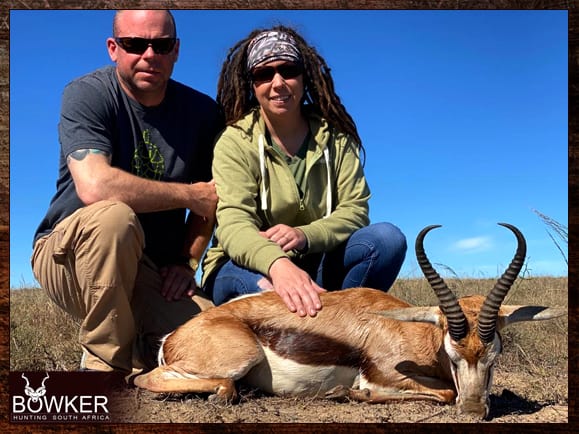
Hunting the Springbok Slam
Four color phases exist: White Springbok, Copper Springbok, and Black Springbok.
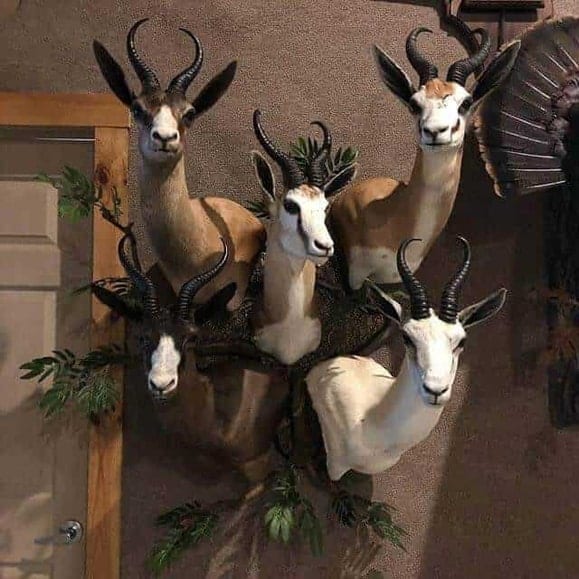
Springbok Slam Hunted with Nick Bowker
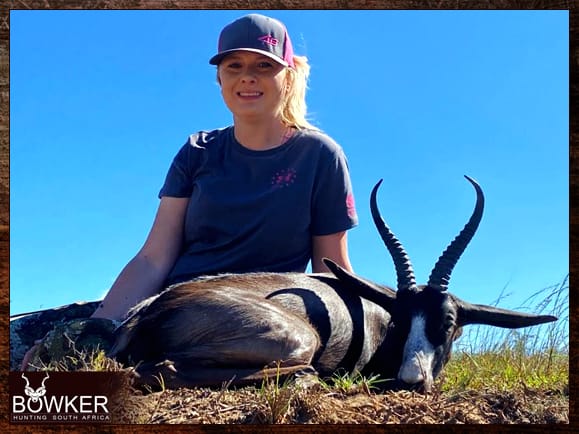

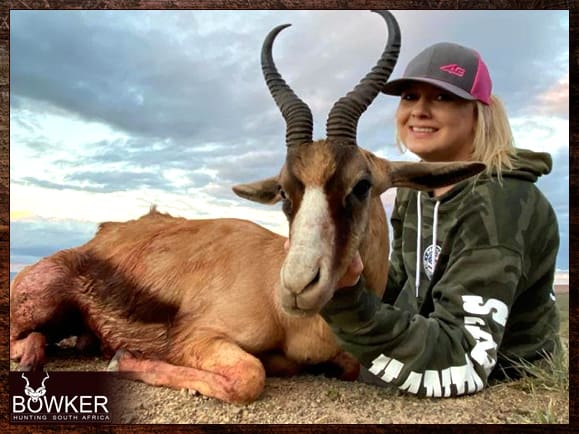

Frequently Asked Questions for Your Springbok Hunt
How much does it cost to hunt a Springbok?

The trophy fee for a standalone Springbok hunt is between $300 and $400. Daily rates vary between $250 and $500 per day.
Included in the Springbok trophy fee is a licensed guide. As well as a hunting license and all permits.
A Springbok trophy is often included in a Plains game package. Package prices vary from $ 3,000 to $10,000, depending on location and size. Packages include 5 – 7 trophy animals, accommodation, meals, and daily rates.
How much does it cost to hunt a Black Springbok?
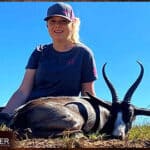
The trophy fee for a standalone Black Springbok hunt is between $400 and $500.
How much does it cost to hunt a Copper Springbok?

The trophy fee for a standalone Copper Springbok hunt is between $400 and $500.
How much does it cost to hunt a White Springbok?
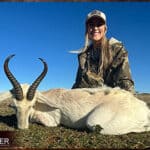
The trophy fee for a standalone White Springbok hunt is between $700 and $900.
How to hunt Springbok?

Springbok is hunted on the open plains. The Springbok is wary and difficult to approach. Longer shots will, therefore, be required.
Springbok bunch together. Shooting the right one will need careful communication with your professional hunter.
Where do you shoot a Springbok?

Shot placement must be in the bottom third of the animal directly above the front shoulder. This will ensure a heart or lung shot. Avoid head and neck shots, which are high-risk.
What is a trophy, Springbok?
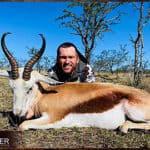
Springbok trophies have a Horn Length of approximately 12 – 14 inches. The minimum qualification score under Safari Club International for a Springbok is 30. Add the length of each horn and the circumference of the bases to get your SCI score.
Seasonal Restrictions
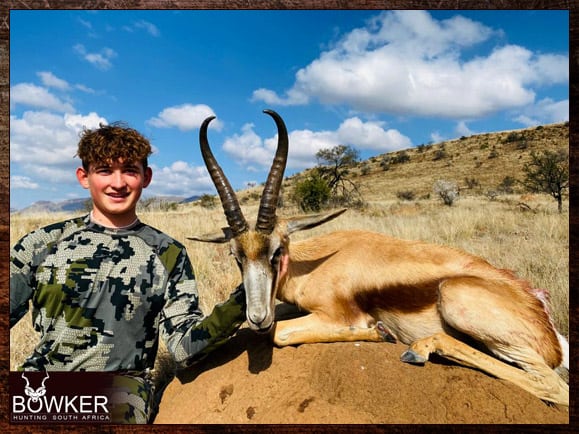
When can you hunt Springbok in South Africa?
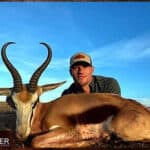
There are no seasonal restrictions on springbok hunting in the Eastern Cape of South Africa for most outfitters.
How do you judge a Springbok trophy?

The trophy quality lies in the bases’ width, the overall length, and the curls on the horns’ tips.

The Springbok in images
